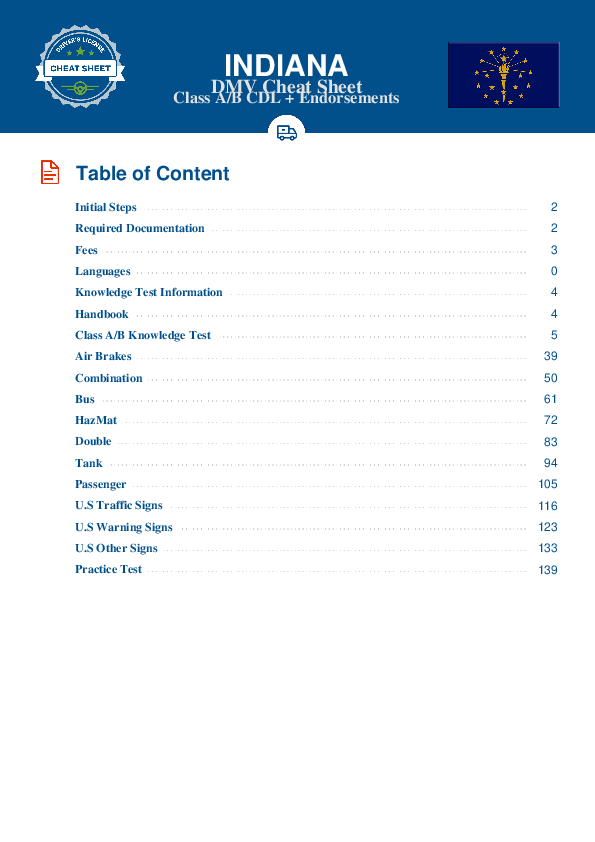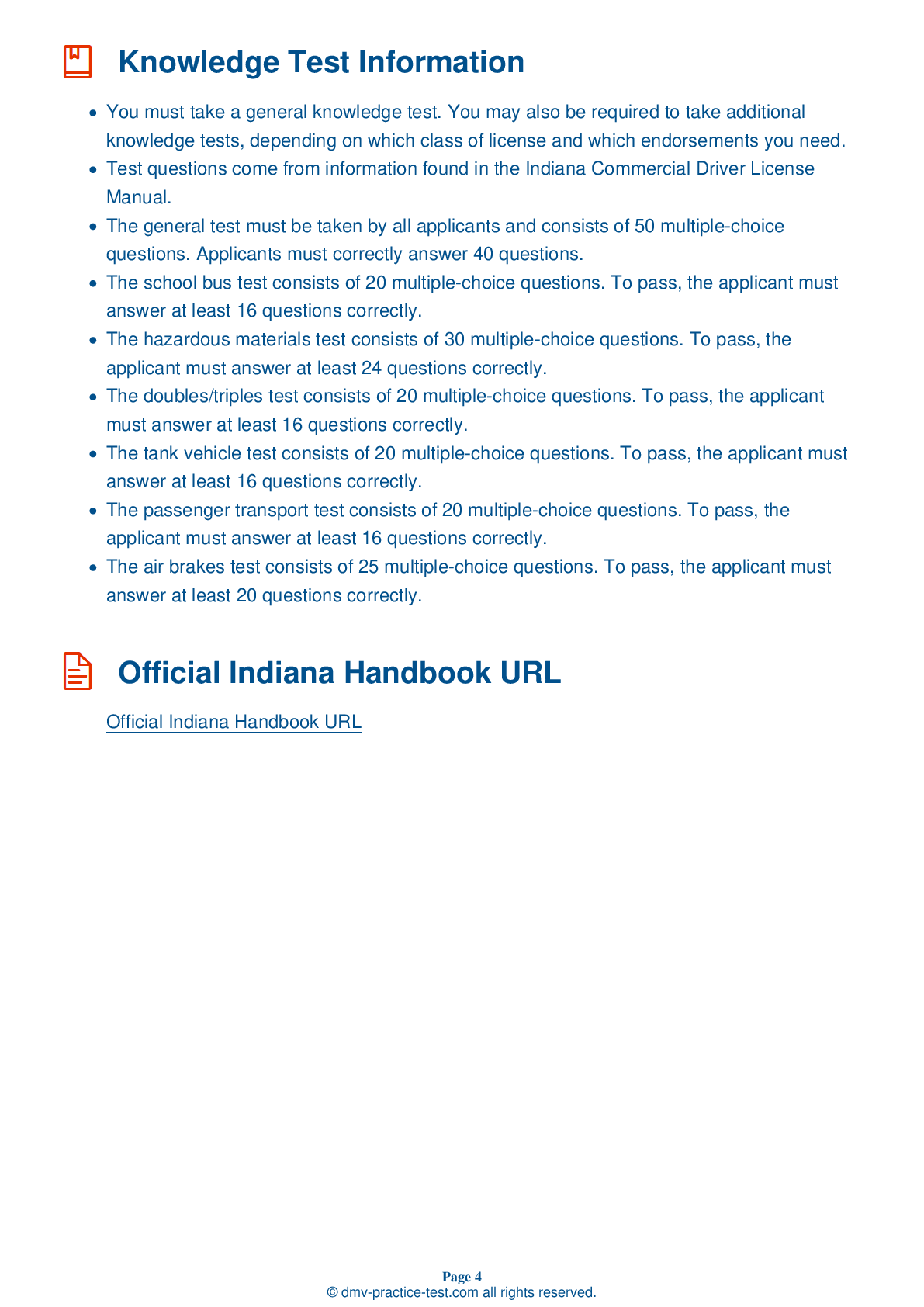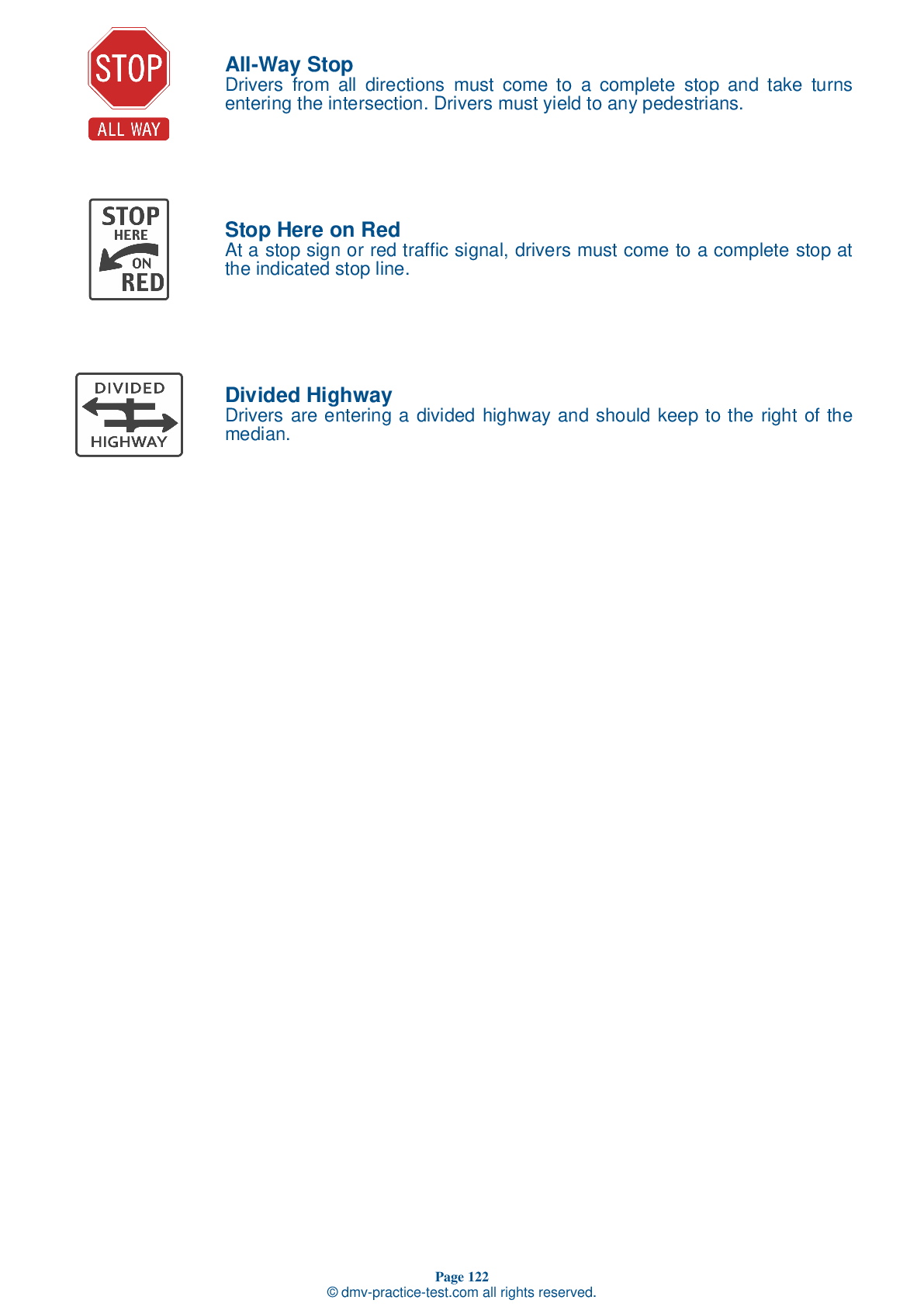Combination #1
Combination Vehicles Practice Test | Indiana 2026 #1 Page 2 of 3
Train for FREE online with our Indiana CDL combination vehicle test. The official exam test consists of several obligatory parts, with all of them checking your knowledge of different blocks of road rules. If you need to obtain a IN combination license in 2026, practice as much as possible. Free sample tests published on our website will help you check and improve your knowledge and boost your grades. Please bear in mind that DMV requirements for issuing a combination license may vary from state to state.
20
16
20
8 . If your trailer goes off course while you are backing, you should:
Turn the steering wheel all the way to the left until the trailer straightens out.
If your trailer goes off course while you are backing, you should pull your truck forward and reposition your vehicle as needed before continuing to back up.
9 . A lightly-loaded combination vehicle will stop more slowly than a fully-loaded vehicle because:
The suspension springs only operate when a trailer reaches a minimum weight.
An empty combination vehicle will come to a complete stop more slowly than a fully-loaded vehicle. The stiff suspension springs and strong brakes will have lower traction on a light trailer than they would if the vehicle carried more weight.
10 . The trailer hand valve:
Should only be used when transporting cargo.
The trailer hand valve should not be used for parking. This could cause all of the air to leak out of the braking system, resulting in the brakes releasing. Instead, use the parking brake.
11 . The trailer hand valve should:
Be used on slippery surfaces.
The trailer hand valve works the trailer brakes but should only be used when testing them. Using it while driving could create a skid. Never use the trailer hand valve while parking because doing so may release the air pressure from the braking system, releasing the brakes that are holding the vehicle in place.
12 . Rollovers are most likely to happen when:
It is raining.
Rollovers happen when an operator turns too fast. Drivers should be sure to slow down before entering turns and curves, especially when transporting a fully-loaded rig.
13 . In a combination rig, it is best to make:
Slow, planned stops.
When driving a combination vehicle, it is important to brake well in advance and look far ahead of your vehicle to avoid the need for sudden stops. Making habits of these actions will help you prevent your trailer from jackknifing.
14 . ____ are the cause of more than half of all accident-related truck driver deaths.
Pedestrians
More than half of all accident-related truck driver deaths are a result of truck rollovers. To help prevent a rollover, be sure to load cargo low to the ground and centered on your rig. Take corners slowly and carefully.
2026 Indiana | Frequently Asked Questions
A CDL Class A license in Indiana is defined as a commercial driver's license that permits the holder to operate any combination of vehicles with a Gross Combination Weight Rating (GCWR) of 26,001 pounds or more, provided the GVWR of the vehicle(s) being towed exceeds 10,000 pounds. This includes tractor-trailers, truck and trailer combinations, and flatbeds.
A Class A Commercial Driver's License (CDL) in Indiana allows you to operate vehicles such as tractor-trailers, truck and trailer combinations, tank vehicles, livestock carriers, and flatbeds. You can drive vehicles with a Gross Vehicle Weight Rating (GVWR) exceeding 26,001 pounds, provided the GVWR of the vehicle being towed is more than 10,000 pounds.
To obtain a Class A CDL license in Indiana, you must be at least 18 years old (21 for interstate driving), possess a valid Indiana driver's license, pass a vision test, and obtain a medical clearance. You must also pass a written knowledge test and a skills test that includes a pre-trip vehicle inspection, a basic vehicle control test, and an on-road driving exam.
In Indiana, you must be at least 18 years old to qualify for a Class A CDL license for intrastate driving (within Indiana only). However, to drive across state lines or handle hazardous materials, you must be at least 21 years old.
Specific endorsements aren't required for a Class A CDL, but they can enhance your license. Endorsements allow you to drive certain types of vehicles or carry specific types of cargo. Examples include a Tank Vehicle (N) endorsement, a Passenger (P) endorsement, or a Hazardous Materials (H) endorsement. Each requires additional testing.
The Class A CDL skills test in Indiana encompasses three main components: a pre-trip vehicle inspection to assess your ability to determine if your vehicle is safe to drive, a basic vehicle control test to evaluate your handling of the vehicle, and an on-road driving exam to test your practical driving skills in various traffic situations.
Yes, Class A CDL license holders in Indiana may face certain limitations. These can include restrictions based on the driver's medical condition, the type of vehicle used during the skills test, and the absence of certain endorsements. For instance, without a passenger or school bus endorsement, a driver cannot operate those specific vehicles.
Yes, it's possible to take the written Class A CDL test in languages other than English. The Indiana BMV offers the test in fourteen different languages. These include Spanish, Arabic, Chinese, French, and others. However, the Federal Motor Carrier Safety Administration requires a basic understanding of English to drive commercial vehicles.
Yes, in Indiana, you can request accommodations for the Class A CDL written test if you have a disability. The Bureau of Motor Vehicles (BMV) provides assistance to ensure the test is accessible to everyone. However, you must provide necessary documentation and notify the BMV in advance about your specific needs.
Yes, if you don't pass the Class A CDL written test in Indiana, you can retake it. However, you must wait until the next day to do so. If you fail the test three times, you will need to wait 2 weeks before your next attempt. Keep in mind each attempt comes with a fee.



